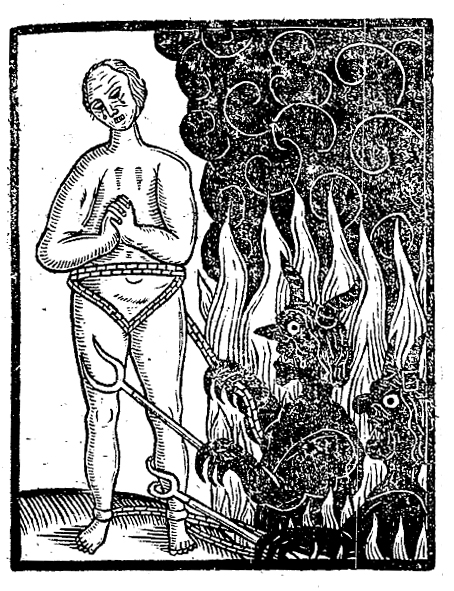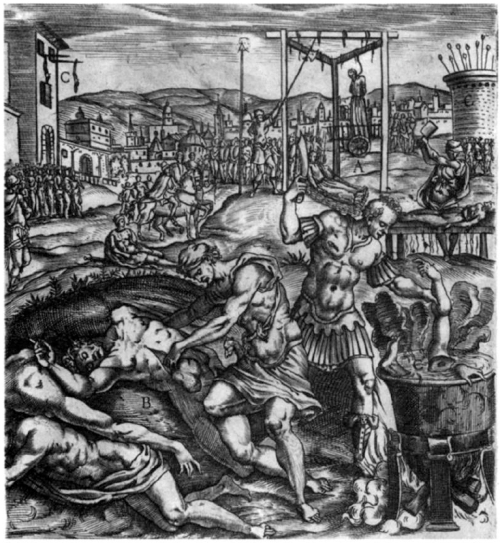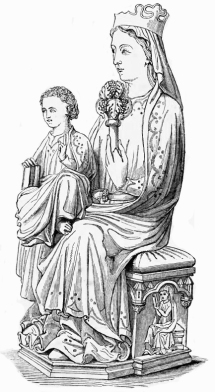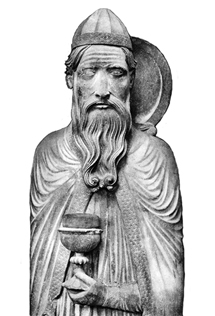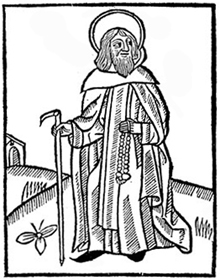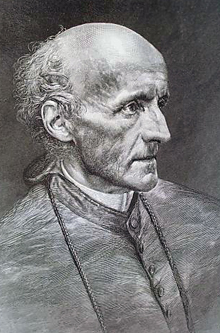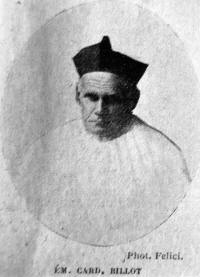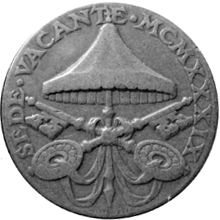Saint Bernard’s Vision
OR,
A brief Discourse (Dialogue-wise) between the Soul and the Body of a damned man newly deceased, laying open the faults of each other: With a speech of the Devils in Hell. To the Tune of, Fortune my Foe.
Printed at London for J. Wright, dwelling in Gilt-spur street. 1640
Newly Transcribed by E.T.H. III for ease of the modern Reader. 2013
The Writer speaketh.
AS I lay slumbring in my Bed one Night,
A fearful Vision did me sore affright:
Me thought I saw a Soul departed late,
By it the Body, in a poor estate.
Wailing with sighs, the Soul aloud did cry
Upon the Body, in the Coffin by:
And thus the Soul to it did make her moan,
With grievous sobs, and many a bitter groan.
The Soul speaketh.
O sinful Flesh, which now so low doth lie,
Whom yesterday the World esteemd so high;
It was but yesterday the World was thine,
Thy Sun is set, which yesterday did shine.
Where is that Train that did attend on thee?
Where is thy Mirth? where is thy Jollity?
Where are thy sumptuous Buildings, and thy Treasure?
Thy pleasant Walks, in which thou tookst such pleasure?
Gone is thy Train, thy Mirth to mourning turn’d,
Thou in a Coffin in thy Shrine art Urn’d:
For thy rich Clothes, thou hast a Winding-sheet,
Thy high-built Roof now with thy Nose doth meet.
But I (poor Soul) was fram’d a noble creature,
In likeness to my God, of heavenly feature:
But by thy sin, whilst we on Earth abode,
I am made fouler than a loathsome Toad.
O wretched Flesh, with me that art forlorn,
That well mayst wish thou never hadst been borne;
Thou never wouldst to any good agree,
For which we evermore shall damned be.
I am and must forever be in pain,
No tongue can tell the torments I sustain;
Both thou and I, we must descend to Hell,
Where we in frying flames for aye must dwell.
It was thy Pride, Deceit, and Luxury,
Hath brought these torments both on me and thee;
Thy Wife, thy Children, Friends, which thou didst trust,
Doth loath thy Carcass, lying in the Dust.
The Book of God, which is both true and sure,
Witness at large what sinners shall endure:
Thou that within thy Bed of Earth art laid,
Arise, and answer to these things I said.
The Body answereth.
I know thee well, my Soul, which from me fled,
Which left my Body senseless, cold, and dead:
Cease then to say, the fault was all in me,
When I will prove the fault was most in thee.
Thou sayst, that I have led thee oft astray,
And from well-doing drawn thee quite away,
But if the Flesh the Spirits power can move,
The fault is thine, as I will plainly prove.
God you do know, created thee most fair,
And of Celestial knowledge gave you share:
I was your servant, form’d of Dirt and Clay;
You to command, and I for to obey.
Twas in your power for to restrain my will,
And not to let me do those things were ill.
The Bodies works be from the Soul derided,
And by the Soul the Body should be guided.
The Body of it self none ill hath known:
If I did what thou bidst, the guilts thine own:
For without thee, the Body resteth dead;
The Soul commands it rests upon thy head.
So to conclude, thy guilt exceedeth mine;
Oh, how the worms do tear me in my Shrine!
And therefore fare thou well, poor sinful Soul,
Whose trespasses pass mine, though they are foul.
The second part. To the same tune.
The Soul answereth.
Most wretched Flesh, which in thy time of life
Wast foolish, idle, vain, and full of strife;
Though of my substance thou didst speak to me,
I do confess I should have bridled thee.
But thou through love of pleasure foul and ill,
Still me resisted and would have thy will:
When I would thee (O Body) have control’d,
Straight the worlds vanities did thee with-hold.
So thou of me didst get the upper hand,
Enthralling me in worldly pleasures band,
That thou and I eternal shall be drown’d
In Hell, when glorious Saints in Heaven are crown’d.
But flatt’ring fancies did thy mind so please,
Thou never thought to die, till death did seize:
This was thy fault, and cursed is our fate,
Which we repent, but now alas too late.
The Body speaketh.
Oh now I weep being scourg’d with mine own rod,
We both stand guilty ’fore the face of God:
Both are in fault, and yet not equally,
The greatest burthen (Soul) on thee doth lie.
No wit so mean, but this for truth it knows,
That where most gifts of virtue God bestows.
There most is due, and ought repaid be;
And unto this there’s none but will agree.
But foolishly thou yieldedst unto me,
And to my vain desires didst soon agree;
But (oh) I know that at the latter hour,
Both thou and I shall find a death most sour.
I greatly fear an everlasting fire,
Yet one thing more of thee I do desire:
Hast thou been yet amongst the fiends of Hell?
Is no hope left, that we with Christ may dwell?
The Soul answereth.
Fond flesh, remember Dives was denay’d,
When for one drop of water so he pray’d:
Thy question (senseless Body) wanteth reason,
Redemption now is hopeless, out of season.
Vile Body go, and rot in bed of Clay,
Until the great and general Judgement day:
Then shalt thou rise and be with me condemn’d,
To Hells hot lake, for ever without end.
So fare thou well, I must no longer stay,
Hark how the fiends of Hell call me away:
The loss of Heavenly joys tormenteth me
More than all tortures that in Hell can be.
The Devils speak.
Ho, are you come, whom we expected long?
Now we will make you sing another song:
Howling and yelling still shall be your note,
And molten lead be poured down your throat.
Such horror we do on our servants load,
Now thou art worse than is the crawling Toad:
Ten thousand thousand torments thou shalt bide,
When thou in flaming Sulphur shalt be fried.
Thou art a soldier of our camp enroll’d,
Never henceforth shalt thou the light behold:
The pains prepar’d for thee no tongue can tell,
Welcome, O welcome to the pit of Hell.
The Writer speaketh.
At this the groaning Soul did weep most sore,
And then the fiends with joy did laugh and roar:
These Devils seem’d more black than pitch or night,
Whose horrid shapes did sorely me affright.
Sharp steely forks each in his hand did bear,
Tusked their teeth, like crooked mattocks were,
Fire and Brimstone then they breathed out,
And from their nostrils Snakes crawl’d round about.
Foul filthy horns on their black brows they wore,
Their nails were like the tushes of a Boar:
Those fiends in chains fast bound this wretched Soul,
And drag’d him in, who grievously did howl.
Then straight me thought appeared to my sight
A beauteous young man, clothed all in white,
His face did shine, most glorious to behold,
Wings like the Rainbow, and his hair like Gold.
With a sweet voice, All hail, all hail (quoth he)
Arise and write what thou didst hear and see:
Most heavenly music seemed then to play,
And in a cloud he vanished quite away.
Awaking straight, I took my pen in hand,
To write these lines the young man did command,
And so into the world abroad it sent,
That each good Christian may in time repent.
Then let us fear the Lord both night and day,
Preserve our Souls and Bodies we thee pray,
Grant that we may so run this mortal race,
That we in Heaven may have a resting place.
Preserve the King, the Queen and Progeny,
The Clergy, Council, and Nobility,
Preserve our souls, O Lord, we do thee pray,
Amen, with me let all good Christians say.
FINIS.

